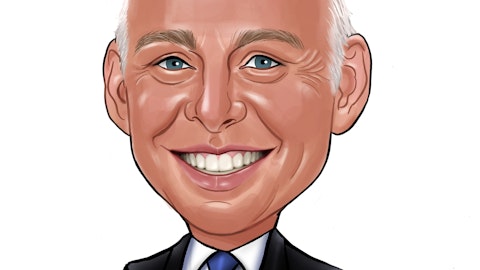Mike Cyprys: Hey, good morning. Thanks for squeezing me again here. Just to follow-up on expenses, Allison, just coming back to the transformational project that you were mentioning earlier. I guess just how much might that lower run rate expenses as you kind of look out over the next couple of years, and as you think about expenses for this year, how are you thinking about the bookends for growth rate and expenses?
Allison Dukes: So in terms of transformational projects, lowering expenses in the next couple of years, I would say they will not contribute to lowering expenses in the next couple of years. As we’ve noted before, the Alpha NextGen is really our most significant investment that we will be making. We will be in the next couple of years deep into the investment period of that, and then we’ll be running parallel for some period of time before we can start to streamline and decommission apps on the other side. So, we are several years away from seeing the benefit of that investment. Again, it’s the right near-term and long-term move for us as a company overall as we think about building to the scale we want to be at in the next five years, seven years, 10 years.
But it’s an investment and it will take some time before we see the payback on that investment. In terms of the bookends of expenses, look the biggest driver of that’s going to be comp and the biggest driver of that’s going to be market related. And so as you think about the variability and our expenses and what could move, the most beyond our expectations and beyond some of the guidance I already gave it would be compensation related. The good news in that is that comes with revenue. And I think that right now as we think about what expense flex we have on the year? I want to make sure it’s clear, we are managing discretionary expenses at every level and really focused on the must haves only, and all the nice to haves are things we are foregoing.
But there are a lot of must haves in this business that we think really position us well to capture demand over the next several years. And we want to stay the course on that even in some of these challenging market conditions. And we’re reallocating the discretionary expenses to some of these foundational investments that we think will serve us well and create the operating leverage for the future.
Mike Cyprys: Great. And just a follow-up question on the cash position, $1.2 billion, how much of that is discretionary? And how do you think about the scenario where buybacks might resume? Thank you.
Allison Dukes: So the $1.2 billion, about $640 million is held for regulatory purposes, so it’s a little bit higher than the last quarter, and that’s really FX related. So you could consider the amount above that $640 million roughly discretionary. As I think about buybacks, I’ll just underscore our capital priorities. The first is supporting our future growth, and we’ve got a lot of investments we want to make in ourselves, and we think that’s going to serve shareholders the best over the long run. We want to focus on maintaining that strong balance sheet and continue to focus on the leverage levels that we have and managing those down. And we also continue to focus on returning capital shareholders, but that we’re going to do first through dividends and steady dividend increases, and it’s really excess cash that we’ll think about for buybacks.
Mike Cyprys: Great. Thank you
Allison Dukes: Marty, anything else?



